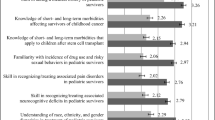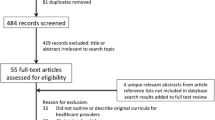Abstract
The cancer population is growing and those with urgent and emergent treatment needs are managed by a wide variety of clinicians, including emergency physicians. Education on evaluation and management of specific oncologic emergencies occurs during medical school, residency, fellowship, and continuing medical education courses. In this chapter, we examine unmet needs for professional education in oncologic emergencies and the need for more defined curricula at each level of training. The need for additional training in palliative and end-of-life care is particularly acute. We describe a comprehensive approach to curriculum development, including general and targeted needs assessment, the development of goals and objectives, educational strategies appropriate to specific groups of learners, and approaches to implementation and evaluation. Finally, we provide a description of current fellowship training and continuing medical opportunities specific to oncologic emergencies.
Access this chapter
Tax calculation will be finalised at checkout
Purchases are for personal use only
Similar content being viewed by others
References
Siegel RL, Miller KD, Jemal A. Cancer statistics, 2020. CA Cancer J Clin. 2020;70(1):7–30.
Larkin J, Chiarion-Sileni V, Gonzalez R, Grob JJ, Rutkowski P, Lao CD, et al. Five-year survival with combined nivolumab and ipilimumab in advanced melanoma. N Engl J Med. 2019;381(16):1535–46.
Sadik M, Ozlem K, Huseyin M, AliAyberk B, Ahmet S, Ozgur O. Attributes of cancer patients admitted to the emergency department in one year. World J Emerg Med. 2014;5(2):85–90.
Thomas PA, Kern DE, Hughes MT, Chen BY. Curriculum development for medical education. 3rd ed. Baltimore: Johns Hopkins University Press; 2016.
Accreditation Council for Graduate Medical Education, American Board of Emergency Medicine. The Emergency Medicine Milestones Project. July 2015. https://www.acgme.org/Portals/0/PDFs/Milestones/EmergencyMedicineMilestones.pdf.
Rivera DR, Gallicchio L, Brown J, Liu B, Kyriacou DN, Shelburne N. Trends in adult cancer-related emergency department utilization: an analysis of data from the nationwide emergency department sample. JAMA Oncol. 2017;3(10):e172450.
Counselman FL, Babu K, Edens MA, Gorgas DL, Hobgood C, Marco CA, et al. The 2016 model of the clinical practice of emergency medicine. J Emerg Med. 2017;52(6):846–9.
Common Program Requirements. Accreditation Council for Graduate Medical Education. (2020). https://www.acgme.org/What-We-Do/Accreditation/Common-Program-Requirements. Accessed 21 Apr 2020.
Accreditation Council for Graduate Medical Education. ACGME Program Requirements for Graduate Medical Education in Emergency Medicine. 2020. https://www.acgme.org/Specialties/Program-Requirements-and-FAQs-and-Applications/pfcatid/7/Emergency. Accessed 21 Apr 2020.
Lamba S, Pound A, Rella J, Compton S. Emergency medicine resident education in palliative care: a needs assessment. J Palliat Med. 2012;15(5):516–20.
Kraus CK, Greenberg MR, Ray DE, Dy SM. Palliative care education in emergency medicine residency training: a survey of program directors, associate program directors, and assistant program directors. J Pain Symptom Manag. 2016;51(5):898–906.
Toohey SL, Wray A, Wiechmann W, Lin M, Boysen-Osborn M. Ten tips for engaging the millennial leaner and moving an emergency medicine residency curriculum into the 21st century. West J Emerg Med. 2016;17(3):337–43.
Wolff M, Wagner MJ, Poznanski S, Schiller J, Santen S. Not another boring lecture: engaging learners with active learning techniques. J Emerg Med. 2015;48(1):85–93.
Lew EK. Creating a contemporary clerkship curriculum: the flipped classroom model in emergency medicine. Int J Emerg Med. 2016;9(1):25.
Neeley BC, Golden DW, Brower JV, Braunstein SE, Hirsch AE, Mattes MD. Student perspectives on oncology curricula at United States medical schools. J Cancer Educ. 2019;34(1):56–8.
Mattes MD, Patel KR, Burt LM, Hirsch AE. A nationwide medical student assessment of oncology education. J Cancer Educ. 2016;31(4):679–86.
Xu J, Murphy SL, Kockanek KD, Arias E. Mortality in the United States, 2018. NCHS Data Brief. 2020;355:1–8.
Horowitz R, Gramling R, Quill T. Palliative care education in U.S. medical schools. Med Educ. 2014;48(1):59–65.
Pavlidis N, Vermorken JB, Stahel R, Bernier K, Cervantes A, Pentheroudakis G, et al. Undergraduate training in oncology: an ESO continuing challenge for medical students. Surg Oncol. 2012;21(1):15–21.
Head BA, Schapmire TJ, Earnshaw L, Chenault J, Pfeifer M, Sawning S, et al. Improving medical graduates’ training in palliative care: advancing education and practice. Adv Med Educ Pract. 2016;7:99–113.
Halfdanarson T, Hogan W, Madsen B. Emergencies in hematology and oncology. Mayo Clin Proc. 2017;92(4):609–41.
Thistlethwaite JE, Davies D, Ekeocha S, Kidd JM, MacDougall C, Matthews P, et al. The effectiveness of case-based learning in health professional education: a BEME systematic review: BEME guide 23. Med Teach. 2012;34(6):e421–44.
Purcell MG, Majzoub IE. The oncologic emergency medicine fellowship. Emerg Med Clin North Am. 2018;36(3):637–43.
The University of Texas MD Anderson Cancer Center. Emergency Medicine. 2020. [Internet] https://www.mdanderson.org/research/departments-labs-institutes/departments-divisions/emergency-medicine.html. Accessed 25 Apr 2020.
Author information
Authors and Affiliations
Corresponding author
Editor information
Editors and Affiliations
Rights and permissions
Copyright information
© 2021 Springer Nature Switzerland AG
About this chapter
Cite this chapter
Creditt, A.B., Sing, K. (2021). Curriculum Development. In: Todd, K.H., Thomas, Jr., C.R., Alagappan, K. (eds) Oncologic Emergency Medicine. Springer, Cham. https://doi.org/10.1007/978-3-030-67123-5_68
Download citation
DOI: https://doi.org/10.1007/978-3-030-67123-5_68
Published:
Publisher Name: Springer, Cham
Print ISBN: 978-3-030-67122-8
Online ISBN: 978-3-030-67123-5
eBook Packages: MedicineMedicine (R0)




